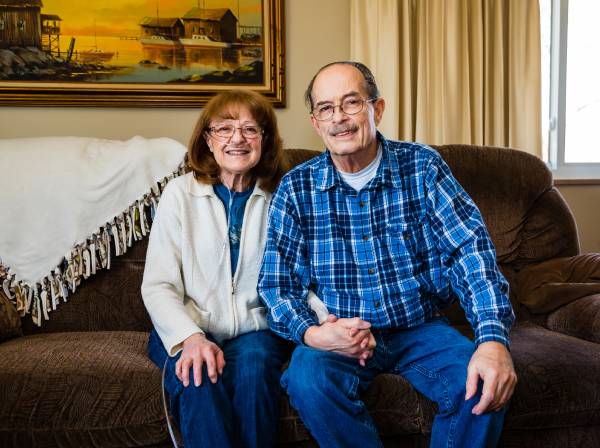
“I was trying to be Mr. Macho, hanging and finishing drywall in this 100-year-old farmhouse, and I started having a pain in my stomach. My cousin, who was helping me hang the drywall, went up to get the homeowner, because he knew I was in pain. Later, my wife Doris said, ‘you're going in now, because you're not going to wake me up at midnight to take you in.’”
Shortly after arriving to the Emergency Department at McLaren Bay Region, several tests were run. The Deans’ were waiting for results when all of a sudden Doris recalls, “he sat down, and said, ‘oh my gosh, I’m going to throw up.’ I rang for the nurse and said, ‘he's throwing up and in really bad shape!’ Then he started having a seizure.”
The Deans’ didn’t realize it at the time, but Clark had just experienced the rupture of an abdominal aortic aneurysm.
“It was like clockwork,” said Doris. “The way they were working. I mean, how can you have so many people in such a little room and nobody tripping over anybody? I mean nobody. There were about 10 or 12 people in there, and Clark was losing blood faster than they could give it to him. They ended up giving him 10 units of blood. He basically lost all of his blood, twice.”
“Dr. Mouawad, the vascular surgeon, came in. He looked at me and then to the rest of the care team in the room and said, ‘I’m going to get ready,’ and boom, he was out of the room,” said Doris. “A few minutes later, another gentleman came in, introduced himself as the anesthesiologist, then boom, he was gone, too.”
“The surgery was long, almost five hours,” Doris recalls. “When Dr. Mouawad came out to give me an update. When I saw the look on his face, I was just so scared. I thought, please, don't tell me you did everything you could, please don't tell me that. He said, ‘it’s going to be a long road to recovery.’ He told me, ‘stitching his arteries was like trying to sew wet paper. They just kept wanting to tear, they were in such rough shape.’”
After nearly a two-week stay at McLaren Bay Region, Clark was able to go home to finish his recovery. “I truly believe they saved his life. I'm just eternally grateful,” said Doris. “Big, big, big hugs to the entire team. Everyone was just so compassionate, so reassuring, and comforting. Jenny, his night nurse, was really good to him. Amanda, his day nurse was just awesome. She would call me to tell me what was going on, and that was really good. I'm just so grateful. All of them were, all the nurses on that floor. I wish I could remember everyone’s name, but there were too many wonderful people.”
“Being on oxygen, I was worried how I would be able to walk all of the way to Clark’s room by myself,” said Doris. “I asked the security guard if there was anyone who would be able to help me, and they instantly had a wheelchair ready. Every day someone would wheel me up there, and then all of the way out to my car when it was time to go home. It really meant so much.”
Clark and Doris realize just how lucky he is to be alive. “My sister is an RN,” said Clark, “she is just overwhelmed with my recovery to this point. She just can't even believe it. After 40 years of nursing, she has never personally seen anybody survive this.”
Doris recalls, “A physician's assistant for Dr. Mouawad was the first one that told me, ‘only two out of every four with this condition, that make it to the hospital, survive.’ We just feel so lucky.”
Clark and Doris want to thank the entire team at McLaren Bay Region. “I hope they realize that they did this,” said Doris. “They carried him from day to day with all their words of encouragement. I really want them to have 100% credit for saving his life.”
After living to share the story of experiencing an abdominal aortic aneurysm, Clark says “I feel like I’m living up to my nickname of Superman.”